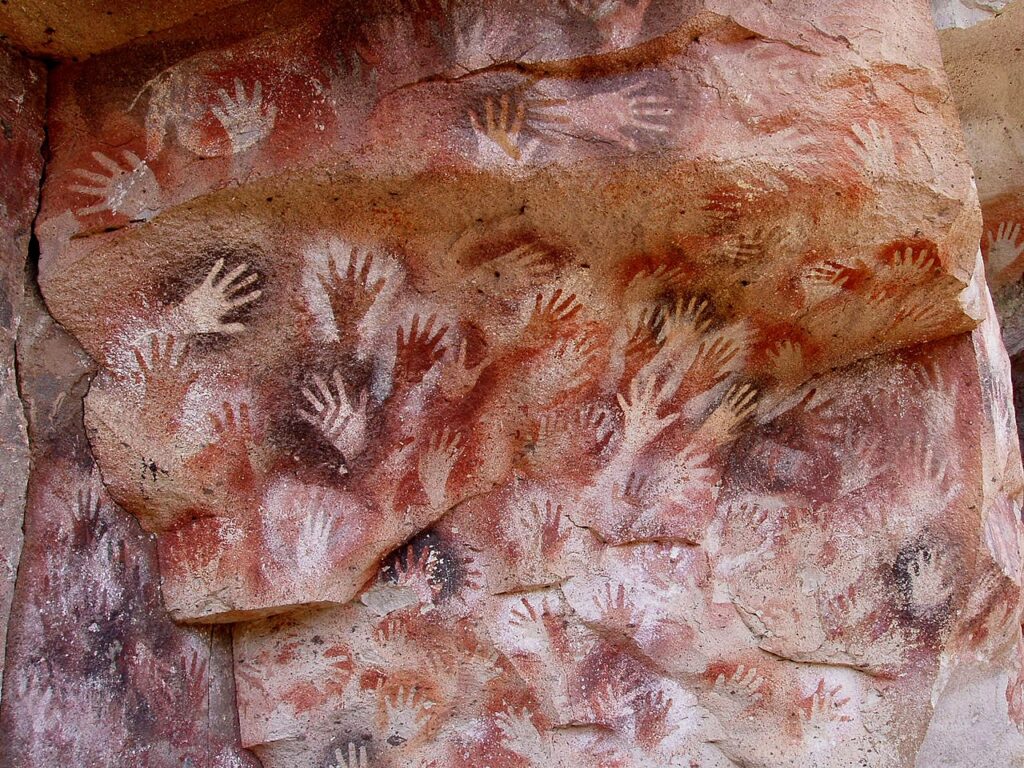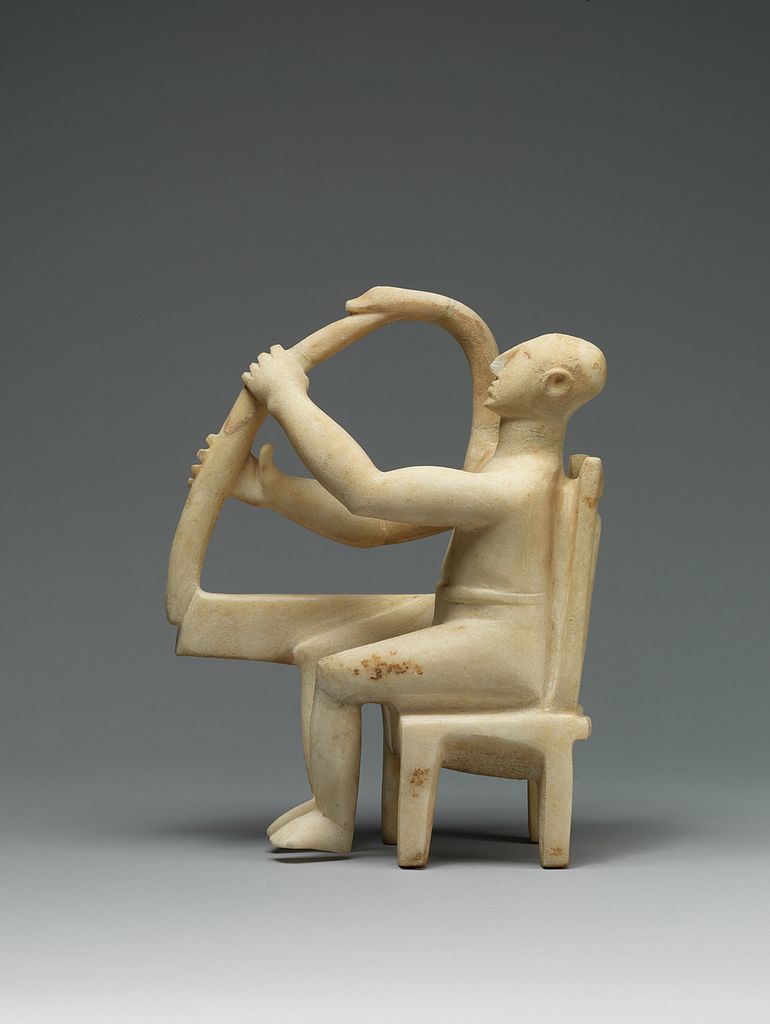A long time ago I used to recite the Apostles’ Creed in church.
I believe in God the Father Almighty, Maker of heaven and earth. And in Jesus Christ, His only Son, our Lord; Who was conceived by the Holy Spirit; Born of the Virgin Mary; Suffered under Pontius Pilate; Was crucified, dead and buried; He descended into Hell; The third day He rose again from the dead; He ascended into heaven; And sitteth on the right hand of God the Father Almighty; From thence He shall come to judge the living and the dead. I believe in the Holy Spirit; The Holy Christian Church, the Communion of Saints; The Forgiveness of sins; The Resurrection of the body; And the life everlasting. Amen.
Reading this still takes me back to being a member of the church choir (complete with cassock), facing the altar and reciting it in unison with others. I had that wonderful feeling of belonging to a community through joint submission to God. I don’t believe any of that anymore. I miss it.
Instead I’m going to try and explain my current view of the world, partly to express myself and partly to sort my ideas out. There’s nothing quite like the discipline of writing something down to discover sloppy thinking.
I’m a fundamentalist at heart, that is to say I’m always wanting to understand the reasons for things. I find the causes more profound and interesting than the consequent effects or symptoms. Effects follow from causes, and although I think it is more complex than that, we have to start somewhere. Here, then, are the two things on which I base everything.
1. Darwin got it right
That evolution is happening right now, brought about by selective pressure and DNA mutations is certain. Breeding crops and animals for our advantage has been done since pre-history. In the 19th century, Malthus realised that populations would grow without limit but were constrained by resources. Darwin figured out the fundamentals of evolution but never understood the detailed mechanisms although Mendel was taking the first steps at about the same time. In 1953 Crick, Watson and Franklin deduced the structure of DNA, the famous double helix, and understood that it contained information which could be replicated. Within the last decade or two gene sequencing has become routine. We don’t understand the whole of the genome for sure, but we are starting to be able to edit genes for favourable and in particular, profitable characteristics.
It is possible to make evolution happen. The first recorded observation of evolution in “real time” and recognised as such was the peppered moth. This animal has a gene that can make it dark or light. During the industrial revolution most surfaces in the smoky areas grew dark with pollutants, and the proportion of dark moths went from around 0.01% to 98%. When the clean air act and other similar measures turned the surfaces lighter again, back went the proportion of lighter coloured moths.
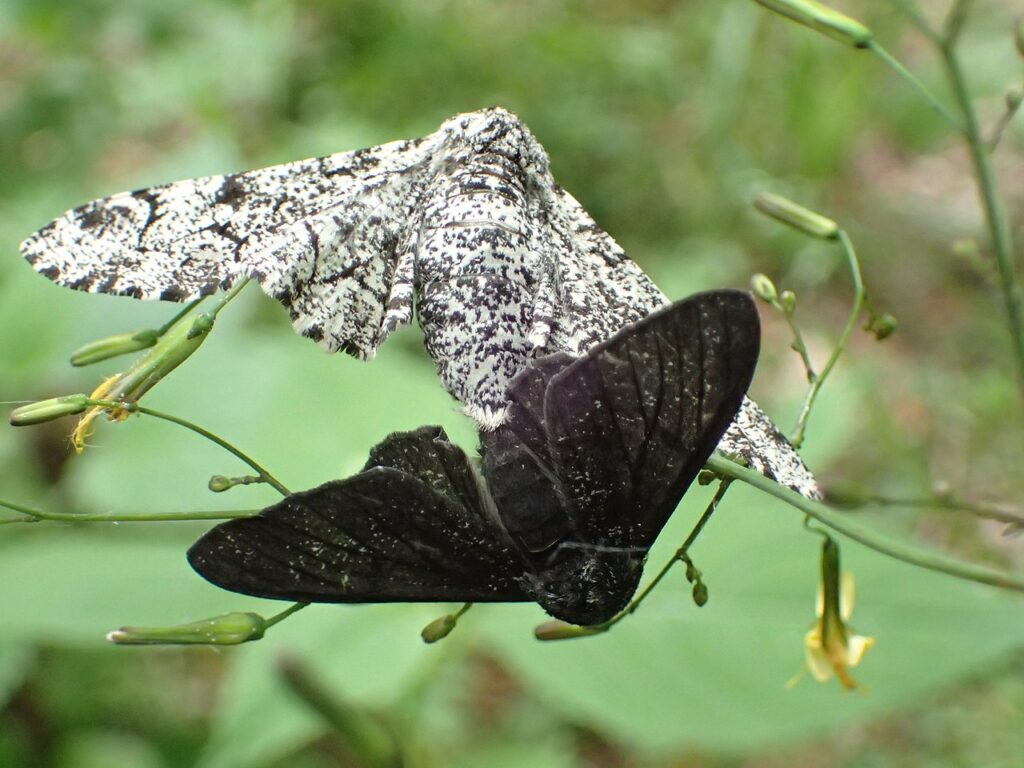
(This is probably the most famous case of industrial melanism, there are others.)
The best and biggest evolution experiment is the “long term evolution experiment” pioneered by Richard Lenski. In 1988 he took 12 identical populations of bacteria and grew them in a nutrient poor medium. Every day and for each of the twelve populations, he transferred 1% into fresh growth medium and discarded the rest. He froze a large sample of every 500th generation for later analysis. Over 32 years and 73,500 generations the populations have diverged, with the genome record of each available from the frozen samples. The bacteria have got bigger and rounder for a minor benefit but losing the ability to resist a change in the concentration of their medium (which was now constant). They have all evolved to survive the poor nutrients, with one population evolving an entirely new mechanism to do so. Some of the populations have split into two co-existing types, one having an advantage during growth and the other when the glucose had run out – this is the origin of a new species.
My favourite example of evolution is one frequently used to argue against it, that of the eye. You cannot, it is argued, come up with a mutation that produces a working eye in one move. True, but then it didn’t evolve that way. There are plenty of examples of intermediate forms of the eye, with the most fantastical being that of many insects which can detect movement but cannot really appreciate the subtle depiction of old age by Rembrandt.
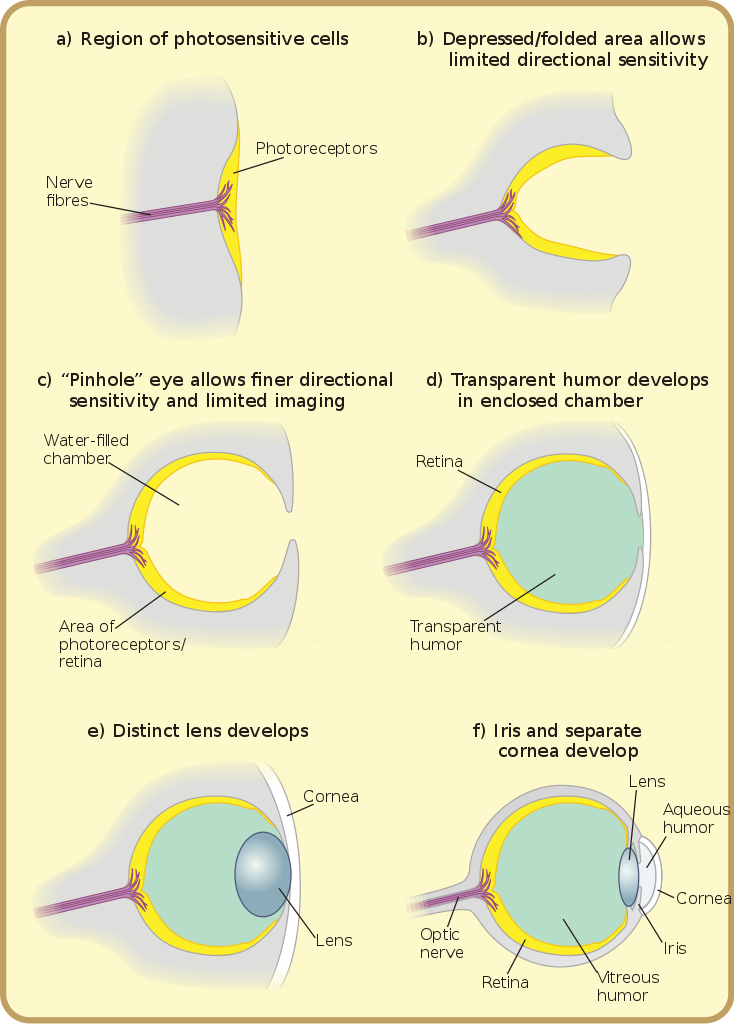
But here’s the thing, not only did the eye evolve, but it did so (at least) twice coming up with different designs. Mammal eyes focus by changing the shape of the lens, cephalopods (octopuses and the like) do it by moving the lens back and forth in the same way as the lens of a camera.
The most troublesome evolution at the time of writing is of course that of the Covid-19 virus. The latest variant is more infectious, but probably still susceptible to the vaccines currently being deployed (this is from molecular studies of which bits of the virus have changed, it is too soon to determine if this is correct in practice). Undoubtedly when the majority of the population has been vaccinated and the selective pressure mounts, the virus will develop a mutation to evade the current vaccines and new ones will have to be developed. This vaccine was developed because a lot of the ground work had already been done because of scares like SARS and MERS[3]. It doesn’t get much publicity now, but there’s been a war for several decades between antibiotics and bacteria with the bacteria slowly winning. Evolution is real and happening right now.
Evolution is also very visible in fossil records. New species don’t come from nowhere, they have predecessors. I know less here, but for example whales, obviously, don’t have any legs but they clearly used to have; look at the skeleton of a blue whale (London’s natural history museum) and you can see its the tiny little remains of what used to be its back legs, the front ones have turned into huge fins. There’s a theory out [Whale hips] that says the hips have been repurposed; no reason why not. Why would that be unless whales are descended from an animal that once had four legs? Genetic studies have revolutionised this area, you can tell when species split and when from comparing DNA. That whales and cows are fairly closely related[4] strikes me as funny, but perhaps not so surprising. Whales are air breathing mammals – they give birth to live young and feed them with milk (a blue whale mother can produces 200 litres of milk per day with a fat content of 35% – 50%).
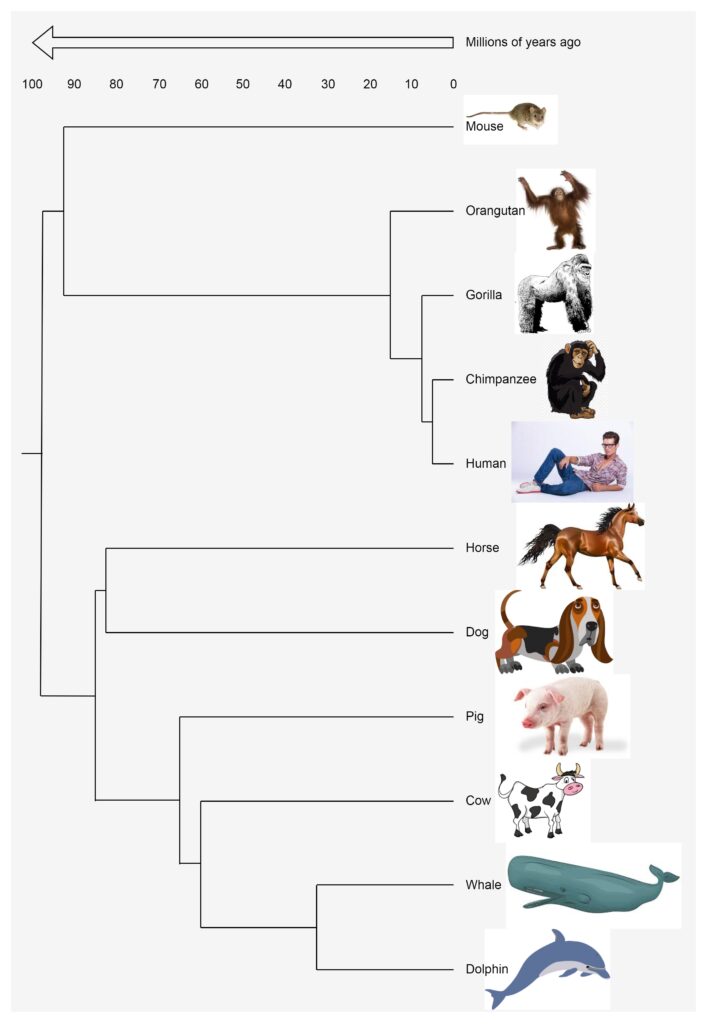
2. People don’t differ that much
I think that people are fundamentally similar, but I think that upbringing has a huge effect. I do claim some evidence for this obviously dualistic argument though…
Religion
I never think it gets said enough that one’s religion, the supposed foundation of one’s entire moral system depends a hell of a lot on what your parents taught you and therefore on where you were born. It’s not completely true of course, but the correlation is striking. The fact that you will most likely believe in the god that was taught you first is to me irrefutable proof that gods are man-made. I believe that like some other weird things such as an appreciation of art and music, belief in god is a rather unwanted side effect of intelligence.
But, as an atheist, why am I in a minority? It is clear that we all have some sort of religious or spiritual need, even me. I used to be a Christian. When I was about twenty I lost my faith and now miss that inner certainty that God was with me; I would quite like replacement please. Our religious need is often filled by what is taught by your parents and we tend to believe what we are taught first probably because it’s easier not to have to rethink things. Religion has been around the start of recorded history (which is not that long at all in evolutionary timescales), and probably a lot longer than that; it seems to be innate in humans at least. But how that expresses itself, whether your concept of god is of an extended paternal figure or something to do with a cow that I don’t understand, depends a lot on how you were brought up.
Writing
Writing goes back a few thousand years and fortunately we can read most of it. I always find it remarkable how something written in a different society and in a different age has so much in common with the modern day. Confucius is a good example; have a read of The Analects. A lot of it is rather pompous but wouldn’t sound out of place in a letter of advice from a Victorian to his son. I was just out of university when I first met it, flexing my intellectual muscles and thinking that I was the bee’s knees to academia when I came across the first sentence, written 2500 years ago, “Is it not a pleasure, having learned something, to try it out at due intervals”. That fitted me exactly at that time (and I like to think, still). It quite shook me that someone from quite so long ago had my number. Another one by Confucius, by the way, is “By nature, men are nearly alike; by practice, they get to be wide apart”, which is rather my central thesis here.
Art and Music
This is rather similar to writing. It’s universal, predating writing and seems to be a universal need. We have radically different sorts of art yet most of it is instantly recognisable as art. I can look at art from most ages and most times and feel (or think I feel) a connection to the artist. These pile of rocks and the handprints were made around 20,000 years apart, but I think they come from the same fundamental urge.
Another example if I may is of sculpture:
These were made 2800-2700 BC (Greece or Turkey), 10th – 12th century (Mexico) and 1937 (England).
I think that music has changed the most, probably from advancing technology. Harps existed 5,000 years ago (see the seated harp player above), organs have a surprisingly long history and there are plenty of other instruments which can be traced back several millennia.
None of this should be that surprising, in a mere 5,000 years evolution has had little effect on us, it’s just that these days we have bigger toys to play with.
Lower than the angels
I love that phrase, it comes from the old testament, Psalms 8.5, and was the chapter title of one of the formative influences on my teenage life, Jacob Bronowski’s The Ascent of Man.
As an animal, man is not that great, he’s not good at sprinting, fighting, swimming, climbing, or indeed reproducing (although I read that we are quite good at jogging). What we have achieved has been done with intelligence and co-operation, built into our DNA and reinforced by learning, particularly by imitation. Morals arise from this, pattern recognition and a great ability to categorise forms the basis of intelligence. This also seems to have some rather odd side effects such as the ability to appreciate art and music, an innate sense of rhythm and strangest of all, a religious need making us want to believe in and often worship something greater than ourselves.
We are all born with the same impulses summarised by Maslow’s hierarchy of needs[5]. Human society hasn’t been around long enough for evolution to change much so we still have the evolved moral sense to hold a society together. We also are probably the cleverest of all the animals and learn things initially by imitation. Small wonder that by nature, men are nearly alike; by practice, they get to be wide. We have evolved in one world and now live in another that we ourselves have created.
Is that it?
Well, yes, this is where I start from; if you could prove to me that either of these is wrong, I’d have to do a lot of rethinking. Here’s where I end up – see the rest of the sheets form some of route. I’m sorry it lacks the poetry and cadence of the Apostles’ Creed.
Credo
I believe that there is no heaven, and that there is no hell. After death there is nothing, neither judgement nor punishment nor reward, not even forty virgins (or even forty grapes). The only things that matter are those which are in front of us. For example, we can choose to be nice to each other, or selfish and hostile, ultimately it doesn’t matter. But, as a matter of practice, life is more pleasant for more people if we are nice to each other. You have the prisoner’s dilemma; recognise it, take the mature approach and be nice. After all, we are somewhat genetically programmed to do this, so embrace it and each other, it’s not so difficult.
References
[1] Photograph by Siga, Creative Commons licence
[2] Diagram of eye by Matticus78, GNU Free Documentation License
[3] https://www.nature.com/articles/d41586-020-03626-1
[4] Park, Jung Youn et al. “Cetaceans evolution: insights from the genome sequences of common minke whales.” BMC genomics vol. 16,1 13. 22 Jan. 2015, doi:10.1186/s12864-015-1213-1
[5] … although he missed out the bottom layer of a decent Wi-Fi signal

